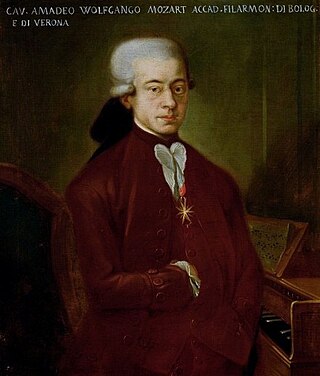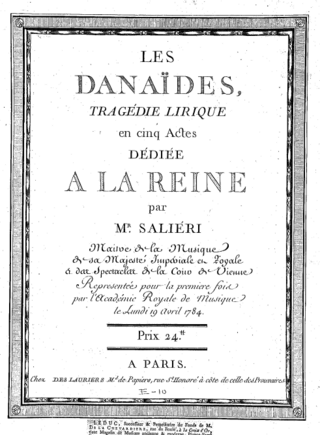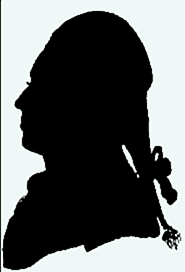
Antonio Salieri was an Italian composer and teacher of the classical period. He was born in Legnago, south of Verona, in the Republic of Venice, and spent his adult life and career as a subject of the Habsburg monarchy.

Giovanni Battista Casti was an Italian poet, satirist, and author of comic opera librettos.

Christophe Rousset is a French harpsichordist and conductor, who specializes in the performance of Baroque music on period instruments. He is also a musicologist, particularly of opera and European music of the 17th and 18th centuries and is the founder of the French music ensemble Les Talens Lyriques.

Roland is an opera with music by Jean-Baptiste Lully and a libretto by Philippe Quinault. It was first performed on January 8, 1685, at the Palace of Versailles by the Académie Royale de Musique and later, beginning on March 8, 1685, at the company's public theatre in Paris, the Théâtre du Palais-Royal. The story is derived from Ariosto's epic poem Orlando Furioso. The opera takes the form of a tragédie en musique with an allegorical prologue and five acts.

Bellérophon is an opera with music by Jean-Baptiste Lully and a libretto by Thomas Corneille and Bernard le Bovier de Fontenelle first performed by the Opéra at the Théâtre du Palais-Royal in Paris on 31 January 1679.

Tarare is an opéra composed by Antonio Salieri to a French libretto by Pierre Beaumarchais. It was first performed by the Paris Opera at the Théâtre de la Porte Saint-Martin on 8 June 1787. Salieri also reworked the material into an Italian version retitled Axur, re d'Ormus with libretto by Lorenzo Da Ponte, which opened in Vienna in January 1788.

La Betulia liberata is a libretto by Pietro Metastasio which was originally commissioned by Emperor Charles VI and set to music by Georg Reutter the Younger in 1734. It was subsequently set by as many as 30 composers, including Niccolò Jommelli (1743), Ignaz Holzbauer (1752), Florian Leopold Gassmann (1772), Joseph Schuster (1787), and most famously Wolfgang Amadeus Mozart (1771).
The French musical ensemble Les Talens Lyriques was created in 1991 in Paris, France, by the harpsichordist and orchestral conductor Christophe Rousset. This instrumental and vocal formation derives its name from the subtitle of Les fêtes d'Hébé (1739) an opera by Jean-Philippe Rameau.

Armida is an operatic dramma per musica by Antonio Salieri in three acts, set to a libretto by Marco Coltellini. The plot is based on the epic poem Gerusalemme liberata by Torquato Tasso. Lully, Handel and Traetta, to name but a few, had already composed operas based on the situations that Tasso originally developed. The plot of all of these, and Salieri's work, is based on the relationship between Armida and the Crusader Rinaldo.

Les Danaïdes is an opera by Antonio Salieri, in five acts: more specifically, it is a tragédie lyrique. The opera was set to a libretto by François-Louis Gand Le Bland Du Roullet and Louis-Théodore de Tschudi, who in turn adapted the work of Ranieri de' Calzabigi. Calzabigi originally wrote the libretto of Les Danaïdes for Christoph Willibald Gluck, but the aged composer, who had just experienced a stroke, was unable to meet the Opéra's schedule and so asked Salieri to take it over. The plot of the opera is based on Greek tragedy and revolves around the deeds of the mythological characters Danaus and Hypermnestra.

Les Horaces is an operatic tragédie lyrique by Antonio Salieri. The text was by Nicolas-François Guillard after Pierre Corneille's Horace.

Dardanus is an opera by Antonio Sacchini. It takes the form of a tragédie lyrique in four acts. It was first performed at Versailles on 18 September 1784, and subsequently at the Paris Opera on 30 November of the same year. The French-language libretto was adapted by Nicolas-François Guillard from that by Charles-Antoine Leclerc de La Bruère, which had already been set to music by Jean-Philippe Rameau in his earlier opera of the same name.
Antigona (Antigone) is an opera in three acts in Italian by the composer Tommaso Traetta. The libretto, by Marco Coltellini, is based on the tragedy Antigone by Sophocles.

Vincenzo Calvesi was an Italian operatic tenor and impresario. A skillful lyric tenor, he began his career performing in opera houses in Italy during the 1770s. He was active in Dresden in 1782 to 1783 and then spent most of his time performing in Vienna from 1785 to 1794. He is best remembered today for creating the role of Ferrando in the world premiere of Wolfgang Amadeus Mozart's Così fan tutte in 1790. That same year the Viennese publication Grundsätze zur Theaterkritik described him as "one of the best tenors from Italy…with a voice naturally sweet, pleasant and sonorous." He was later active in Rome as an impresario up until 1811.

Le feste d'Apollo is an operatic work by Christoph Willibald von Gluck, first performed at the Teatrino della Corte, Parma, Italy, on 24 August 1769 for the wedding celebrations of Ferdinand, Duke of Parma and Archduchess Maria Amalia of Austria.

Renaud is an opera by Antonio Sacchini, first performed on 28 February 1783 by the Académie Royale de Musique at the Théâtre de la Porte Saint-Martin in Paris. It takes the form of a tragédie lyrique in three acts. The French libretto, by Jean-Joseph Lebœuf, is based on Cantos XVII and XX of Torquato Tasso's epic poem Gerusalemme liberata and, more directly, on the five-act tragedy by Simon-Joseph Pellegrin, Renaud, ou La suite d'Armide, which had been set to music by Henri Desmarets in 1722 and was intended as a sequel to Lully's famous opera Armide. According to Théodore Lajarte, Lebœuf was helped by Nicolas-Étienne Framery, the regular translator of Sacchini's libretti.

Hercule mourant is an opera by the French composer Antoine Dauvergne, first performed at the Académie Royale de Musique on 3 April 1761. It takes the form of a tragédie lyrique in five acts. The libretto, by Jean-François Marmontel, is based on the tragedies The Women of Trachis by Sophocles and Hercule mourant, ou La Déjanire (1634) by Jean Rotrou.

La capricciosa corretta is a comic opera in two acts composed by Vicente Martín y Soler. The libretto is by Lorenzo Da Ponte and has a plot which has a slight similarity to William Shakespeare's play The Taming of the Shrew, but is not based on it. The story takes place over a 24-hour period and examines the marriage of an older man to his vain and capricious second wife whose antics make her husband, stepchildren, and servants miserable until she is finally brought to heel through the machinations of her husband's major domo. The opera premiered under the title La scuola dei maritati at the King's Theatre in London on 27 January 1795 to considerable success. It was later performed throughout Europe under the alternative titles Gli sposi in contrasto, La moglie corretta, and La capricciosa corretta—the title used by Da Ponte and the one by which it is known today.

Per la ricuperata salute di Ofelia, K.6 477a, is a solo cantata for soprano and fortepiano composed in 1785 by Antonio Salieri and Wolfgang Amadeus Mozart, and a third, unknown composer, Cornetti, to a libretto written by the Vienna court poet Lorenzo Da Ponte. It is speculated that "Cornetti" may refer to Alessandro Cornetti, a vocal teacher and composer active in Vienna at the time, or that it is a pseudonym of either Salieri or Stephen Storace, a composer who organized the collaborative work to honor his famous sister. The music had been considered lost until November 2015, when German musicologist and composer Timo Jouko Herrmann identified the score while searching for music by one of Salieri's ostensible pupils, Antonio Casimir Cartellieri, in the archives of the Czech Museum of Music in Prague.
Mario Cassi is an Italian baritone.

















